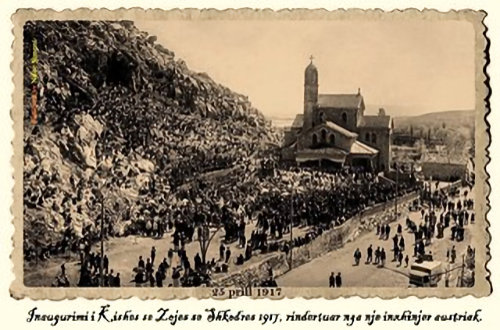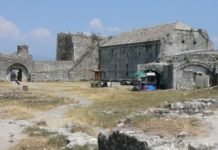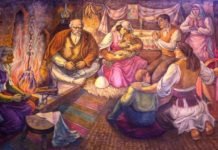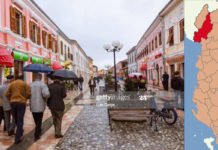Read also:
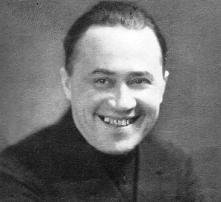
- Ernest Koliqi
- Filip Shiroka
- Gjergj Fishta
- Lazer Shantoja
- Martin Camaj
- Migjeni (poetry)
- Migjeni (prose)
- Ndre Mjeda
- Pashko Vasa
Persecution of Catholics in Albania
Used with permission from the Albanian Catholic Information Center. This article was originally published in the ALBANIAN CATHOLIC BULLETIN, Volumes 7-8, 1986-87. For more information about religious persecution in Albania write: The Albanian Catholic Information Center, Box 1217, University of Santa Clara, Santa Clara, CA 95053.
A BRILLIANT STYLIST OF ALBANIAN LITERATURE
— by Ernest Koliqi
During the tragic period between 1945 and 1949, Archbishop Vincenz Prendushi of Durres, Father Anton Harapi, the Franciscan Provincial, Ethem Haxhiademi of Elbasan, Father Bernardin Palaj, and Reverend Lazer Shantoja disappeared from the Albanian cultural scene. These men represented the leading intellectuals and seminal thinkers in the field of Albanian culture and literature. Their scholarly efforts and literary endeavors were suddenly ended by the Albanian Communist government.
I enjoyed the friendship of Reverend Lazer Shantoja for many years. I came to know of his great literary aspirations. At La Motte in Switzerland in the 1930s, Father Shantoja revealed his oft-delayed plans for a major literary work. He wished to preserve Albanian’s ancient culture and traditions which, after being sifted with western civilization, continued in a transparent modern form. Years earlier the great Albanian poet, Father Gjergj Fishta, O.F.M. (1871-1940), had sung of the heroic struggles of his people against all efforts by their enemies to break the ethnic solidarity of the nation. Shantoja wanted to develop Fishta’s theme but in a much larger fresco. He firmly believed that a national domestic life centered upon all-but-forgotten virtues could flourish but only if built around those hearths where the flames symbolized the cult of liberty based on belief in God.
Only in that setting could the conviction be found that “honor is for life a more necessary nourishing light than the sun itself.” Shantoja reluctantly spoke of this work for the plans were still in gestation. With a great deal of reticence, he revealed that he needed to renew contact with the soil, the people, and the atmosphere of his fatherland. In this regard, he always spoke in such playful and nostalgic phrases as: “I need to eat cornbread with goat cheese, that cheese which preserves the flavor of the foilage of our beech grooves upon which the goats feed.”
With Shantoja, in the La Motte parish home near the Franco-Swiss border, lived the priest’s elderly mother. She was a native of Shkodra. Although uneducated, she overflowed with rich human experiences. Not knowing a word of French, she was continually afflicted with an incurable homesickness. She immersed herself day and night in remembering the lost homeland, events of far away Shkodra, relatives and acquaintances and speaking of faded memories of the past. She spoke the native tongue of Shkodra perfectly. Her nuanced language sparkled with colorful phrases, and was always spoken with the distinctive intonations characteristic of Albanian women of every social class. The poet-son was greatly indebted to her for influencing his style of expression. Elements of his mother’s talents for expression run throughout Shantoja’s works. It was a priceless dowry from a mother to her son.
The Early Years
Lazer Shantoja was born in Shkodra in 1892. During his boyhood, he was steered towards a religious vocation by his priest uncle. In the Jesuit-run Pontifical Seminary at Shkodra, he received a solid cultural preparation and studied Greek, Latin and Italian languages. Shantoja distinguished himself in the language courses. In his early adolescence he came under the influence of the literary movement which appeared on the wake of the early Albanian Cultural revival. His distinguished Albanian Jesuit teachers–Fathers Ndre Mjeda, Anton Zanoni and Mark Bazhdari–served as his role models. For Philosophy and Theology studies he was sent to Innsbruck, Austria. There he learned to read, write, and speak the German language fluently.
Following ordination in 1920, Shantoja was placed in charge of several mountain parishes near Sheldija. This prosperous and pleasant region was not too far distant from Shkodra. I often heard about the learned young pastor who had transported a piano by mule-back over the difficult mountain paths to Sheldija. Almost everyone in the region called him the “pastor with the piano.”
In 1924, Archbishop Lazer Mjeda, the brother of the Jesuit poet Father Ndre Mjeda, came from Skopje to fill the vacant See of Shkodra. The new Archbishop was a strong-willed man of high moral stature and exceptional political foresight. Mjeda’s energy was undaunted. He quickly undertook enlightened and efficient measures to raise the social status and civil power of the Catholic population. He gave his support to the political activity of Luigj Gurakuqi, the Catholic founder and leader of the Christian-Democrat party. A majority of the Moslem population soon allied itself with this party. Archbishop Mjeda promoted the cultural initiative of the citizenry by appointing Shantoja his personal secretary. The poet arrived in Shkodra with his books and his piano. Afterwards in the evenings, piano concert music was played in the Archbishop’s palace. The musical notes from Schumann and Schubert’s works would pour down from the upper windows over the esplanade of the Cathedral and drift into the main thoroughfare. Citizens gathered nightly for the impromptu concerts. Awed passers-by would often gaze in admiration towards the palace window.
In 1923, an official Christian-Democrat party newspaper, ORA E MALEVE, (Defence of the Mountains) began publication. Shortly afterwards, the Archbishop assigned Shantoja to “actively participate” in its compilation. The newspaper enjoyed immediate and extraordinary success. The widely circulated newspaper disseminated democratic ideas throughout an Albanian society that was still imprisoned by anachronistic, medieval concepts.
Shantoja thrust himself into political competition with all the ardor of his capricious temperament. He demonstrated more of the spirit and style of an artist than the passion of a party member. It was precisely this artistic temperament that exploded in brilliant, polemic cues which struck the readers, enthused friends, and irritated his foes. Filled with a joy of expression, he caught in his aim every target. Shantoja’s newspaper work quickly gained him recognition as a writer. His short prose paragraphs and his scratching, corrosive, satiric verses were written in a piercing style and popular vein. They were received with avid interest by the readership.
Producing these emotion-filled works amused him tremendously. His articles of social and political criticism revealed Shantoja’s underlying intent to regenerate the spirit of his people. With the fervor of a true believer and with an unshakeable will, he set out to utilize his learning to fulfill his duty towards his country. Shantoja dedicated every line of his works to the spiritual elevation of the Albanian people.
Unfortunately, the Albanian people in the 1920s and 1930s had not yet reached a level of political maturity necessary either for understanding or sustaining the improvements suggested to them in the works of the innovators. Most Albanians failed to heed the call for better methods of government and the achievement of higher social levels.
The Exile Period
When the government of Bishop Fan Noli collapsed in 1924, hostile, anti-intellectuals filled the political vacuum with the help of foreign mercenaries. Shantoja joined hundreds of other literati and intellectuals in exile. He lived in Yugoslavia for a few years, then moved to Vienna before finally arriving in Berne, Switzerland. He obtained a position as a German speaking chaplain in a Berne Catholic church. Later he moved on to serve as the chaplain at La Motte where he gained fame for his sermons in French.
No impulse of hatred drove Shantoja to participate in political activities in Albania. His writings betrayed great depths of innate ingenuity. They contained fervent emotions and patriotic thoughts endowed with the freshness and idealism of everlasting adolescence. Shantoja’s works, even those considered the most mendacious, provoked admiration from his foes because of the sincerity and loyalty with which they were inspired, and because the bitterness of Shantoja’s irony was always lightened by the stirring elegance of his form.
Shantoja’s rare artistic sensitivity was supported by his solid cultural background, his knowledge of the major European languages and the mastery of his own native tongue. The poet remained open to the most varied manifestations of life and always demonstrated a love for people, music, and sports. Shantoja frequently climbed mountains in Albania, Austria and Switzerland with only a knapsack on his shoulders and an alpenstock in hand. It seemed that he was destined to leave a “mega work” revealing his creative genius, but unfortunately he never did. His memory is preserved only in some brief yet splendid prose, and in a few lofty lyric poems.
After spending 15 years in exile, Shantoja needed the inspiring breath of his homeland and renewed contact with his countrymen in order to create. While awaiting permission to return to Albania he translated the writings of Goethe, Schiller and various Italian poets. Meanwhile he wrote newspaper articles and poetry that appeared in the newspapers owned by fellow exiles. Throughout the final years of exile, there always remained stifled within him the desire to set about the work which would undoubtedly have affirmed his artistic genius and gained him world-wide recognition as a literary scholar.
Return to the Homeland
Finally, Shantoja was allowed to return to Albania in 1940. During this confused, troubled and anxious political period, events took him by storm. He settled down with his mother in a small house in Tirane where he intended to work peacefully with his books and notes. However, in 1944 he was arrested, thrown into a terrible prison, and tortured. After his captors broke his forearm and leg bones, he “walked” by supporting himself on his elbows and knees. When his mother was allowed to visit him, she saw him reduced to such a state that she begged the jailers to “Kill him. Do him this charity! Don’t let him suffer like this!”
Many people wonder why the communists harassed the priest poet in such an atrocious manner. After his return to Albania, he avoided political involvement. In fact, he conscientiously avoided all political currents agitating the country in 1941-1943.
Death of the Priest Poet
The only explanation for the barbarous treatment afforded Shantoja was that the Albanian communists were anti-western and anti-Christian. They hated the priest for upholding sane native traditions and for promoting the regenerative essence of “pure” western civilization, mixed with the truths of Christianity. The cultural enamel of western civilization, which sparkled in his prose and lyrics, irritated and frightened the communists. They saw him as an anti-communist instrument which could easily penetrate young hearts. Many youths enjoyed and adhered to Shantoja’s style. It was nurtured in substance with ethnic juices, but expressed in a very modern key in which suffering and humor harmonized elegantly. He knew how to express in words the typically sarcastic vein of the Albanian race marked with western humor. His few but exemplary works placed him in the mainstream of Albanian literature, next to the most refined Albanian stylist Faik Konitza (1875-1942).
The unspeakable cruelties endured by Shantoja reduced him to a state near death. Finally a communist woman soldier delivered the coup de grace by shooting him in the neck. His body was buried along with the octogenarian Moslem patrician Sulcio Bey Bushati in an unmarked tomb in an unknown place. Sulcio Bey Bushati had represented the whole of the noble Albanian traditions. He was a descendant of the house of princes that ruled northern Albania semi-independently of the “Sublime Porte” of Constantinopole. In burying the pious priest and Moslem nobleman together, the Communist deniers of God and of the homeland deluded themselves into believing they had thrust into oblivion a root of Albanian traditions and its revitalized offshoot.
A FORBIDDEN SONG
— by Rev. Lazer Shantoja
Reverend Lazer Shantoja had pseudonomously written and published a chain of sonnets dedicated to a young woman from Shkodra. The author’s identity was soon discovered and some pious Catholics were scandalized. Nevertheless, the moral character of Shantoja, a confessed Christian Martyr, remains beyond reproach.
Sensitive both to beauty and to those marvelous gifts lavished by God upon mortals, the poet could not remain indifferent towards the female presence nor to the painful feelings endured by his beautiful admirer. These verses express the tumult of emotions that follow from the renouncement of romantic love for a woman. Shantoja poignantly affirmed that only in Heaven could he be free from his religious vows and be enabled to realize perfect emotional expression and fulfillment.
Reverend Shantoja’s sonnets renounced any form of earthly love; yet they rank among the most beautiful of Albanian poems ever dedicated to a woman.
No, do not ask these verses of me.
Destiny forbids. Though you intoxicate
this poet, still his lips must close.
His heart’s song changes to a lament.The lyre with which I wished to gain you honor
I lay down. It cannot thrill with joy
if you may not be goal to my desires
but an abstract goddess only and a Muse.Flower for others then. I, keeping my life from
love, will pass my days, unique among poets,
remembering the kiss you gave me.In my exile the hymn of joy I raised
to Aphrodite will come down
out of the shadow of sad cypresses.
Translated from E.Koliqi’s ANTOLOGIA DELLA LIRICA ALBANESE, Milano, 1963, by Prof. J. Torrens, S.J.

